Keywords: Summer 2022, Podcasting, English as a Second Language (ESL), Multiculturalism, Adobe Audition, Mandela Washington Fellowship, Audiobooks
Brief Overview of Mandela Washington Fellowship
Since 2014, the U.S. Department of State has supported almost 5,100 Mandela Washington Fellows from various countries in Sub-Saharan Africa. The program aims to develop their leadership skills, foster connections, and encourage collaboration with U.S. professionals.
In 2022, the program was hosted by the University of Colorado Denver School of Public Affairs. CU Denver was selected as an institute partner for the first time, making it the first higher education institution in Colorado to participate in the 12-year-old program.
Client
The CU Denver School of Public Affairs. My main contact was Joan Fishburn.
Overview
During the summer of 2022, CU Denver's School of Public Affairs hosted a six-week leadership institute for 25 Mandela Fellows. As part of the program, 19 Mandela Fellows recorded audio versions of children's books from their respective countries in Sub-Saharan Africa. This initiative aimed to benefit ESL (English as a Second Language) kids who could use the audio as a learning tool to improve their English proficiency by following along while reading the associated book.
Process
The only challenge I faced at the beginning of the project was accessing a recording space to produce high-quality audio. To address this challenge, I contacted Brad Hinson to inquire if the university had an audio recording setup. He suggested ThinqStudio's audio recording area and suggested that I contact the director, Dr. Dennis DeBay, to schedule a visit to the space. The studio was equipped with acoustic panels, professional microphones, and audio recording software. As someone who values high-quality audio, I was extremely grateful that this space was available.
To simplify the recording process for the Mandela Fellows, I installed an articulating boom arm, securely attached the arm to a table, and then connected one of the microphones. This allowed the Fellows to position the microphone wherever they felt was best while seated.
I encouraged the Fellows to read their selected book as if they were the narrator. Since sound cannot be seen, I encouraged them to use hand gestures and variations in tone while reading to make the audio recordings more interesting. To demonstrate the use of inflection and hand gestures, I read a passage from each of their books before we started recording. Additionally, I requested that when they finished reading a page, they wait for about five seconds, turn the page, wait for another five seconds, and then resume reading. This was to create two silent sections in the audio file—one before the page turned and another after. The purpose of this was to isolate the sound of a page-turning, making it easier to remove during the editing process.
I utilized Adobe Audition for recording and editing. I also learned to use Audition's Spectral Frequency Display, which visually represents audio as a waveform. Using this tool, I could identify and remove unwanted noises like mouth clicks and pops to produce cleaner-sounding audio.
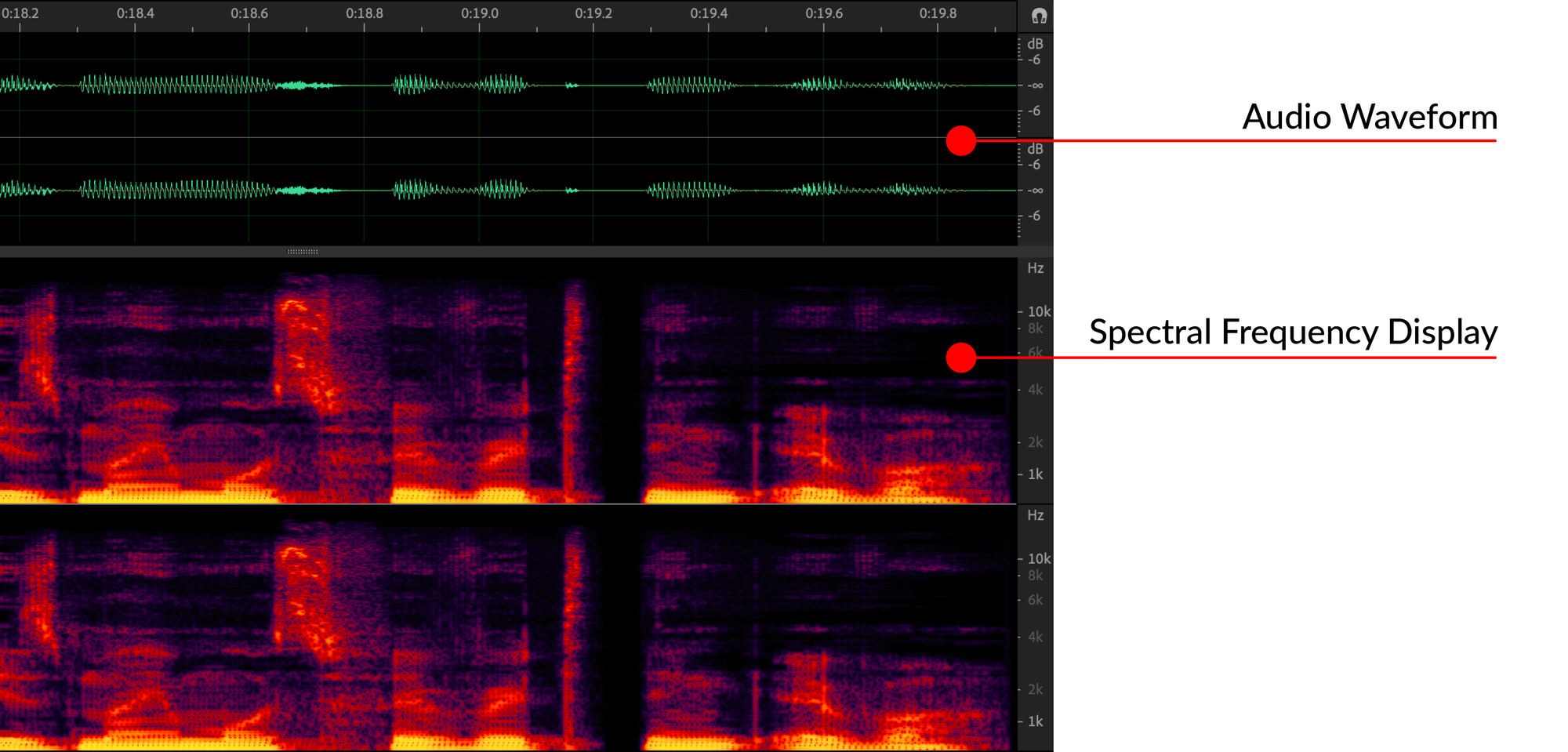
Outcome
The final project consists of 19 audio files. Below are three samples with an accompanying transcript. The samples are followed by links to the remaining 16 audio files.
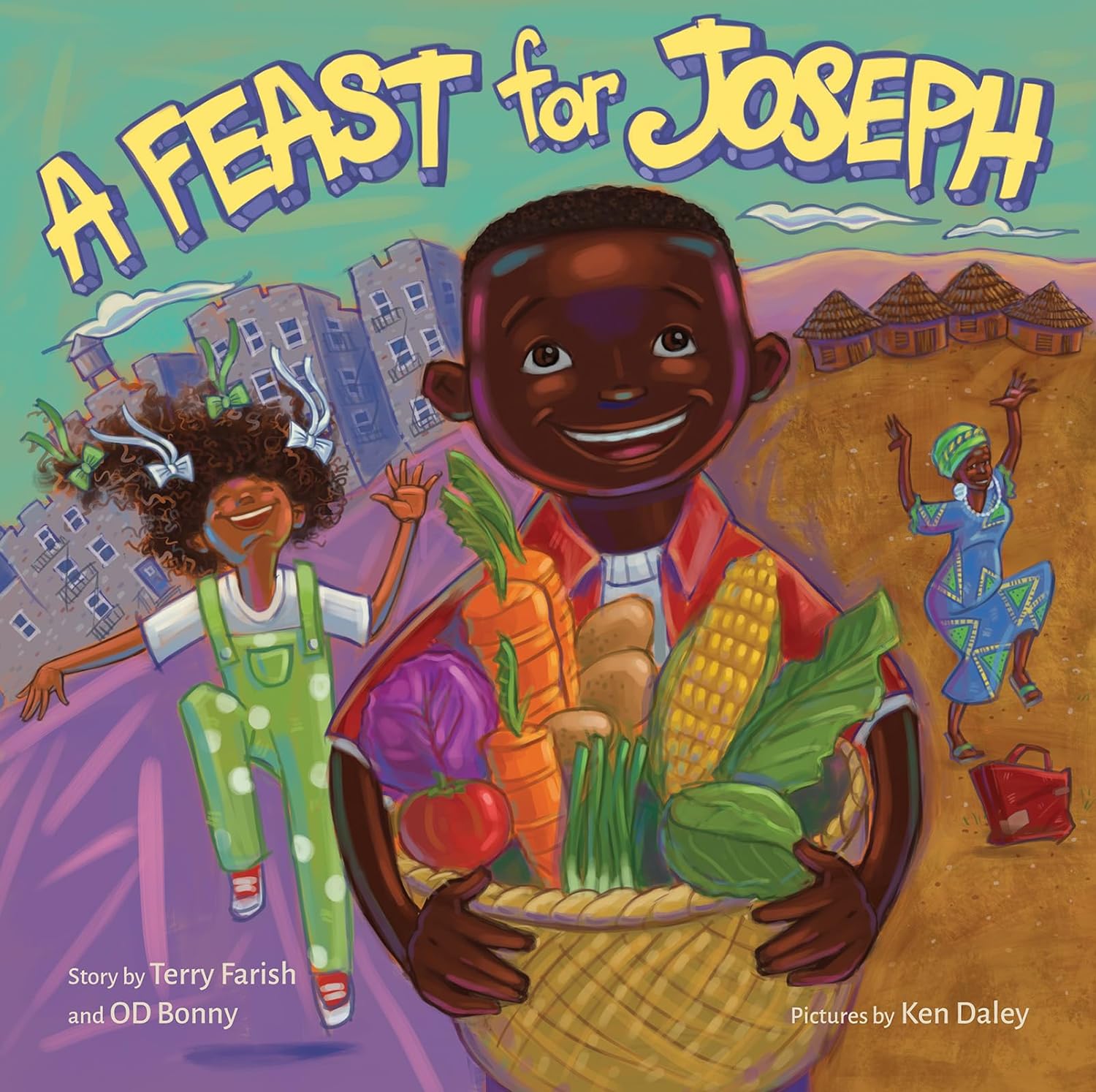
Transcript
My name is Rafaela. I'm reading A Feast for Joseph, a story by Terry Farish and OD Bonny.
Joseph and Mama sit alone on the stoop of their apartment in the moon's light. People rush by. In the refugee camp where Joseph and Mama came from, people cooked at night in the hot wind blowing. Aunties stirred kwon, and the black soot flew. Under the moon, boys played the awal.
Joseph says to Mama, "Here there are not enough people to eat with."
"I'm here!" Whoosh slides down the railing from her apartment upstairs, rainbows streaming from her whoosh of curly hair. "Now we are enough."
But Joseph is busy watching for other people.
He talks to Abuba across the ocean. "I'm waiting for you," he says. He remembers Abuba dancing on her long legs like birds, strut, strut.
"I have my traveling bag with good things," she says. "I wait for the waraga."
At school, Joseph scoops up the kwon and dek ngor that Mama packed for lunch. Whoosh leans over to sniff it. He offers her a taste
"I think I might love it," she says.
When Joseph gets home from school, he looks around to see if a suitcase has come. No.
"I'm here!" Whoosh says.
But Joseph is calling his seven cousins and Auntie and Uncle who live across town. "When are you coming?"
Auntie says, "When we get a day off, we will come."
Mama stirs kwon in a pot on the stove.
"Can I do it?" Whoosh says.
"Like this." Mama shows her how to stir with the long wooden spoon.
Joseph remembers the smell of yen burning in the cook fire. An idea begins. It begins in his belly.
The next day at school, Joseph says to his teacher, "Please come to my house. We will cook for you."
"I'd like that, Joseph," she says. "That will be fun sometime."
But his teacher doesn't come. Abuba doesn't come. No one comes.
Joseph says, "I will invite the neighbors."
"The neighbors?" Mama asks. "What if they don't like kwon and dek ngor?
"I love kwon and dek ngor," Whoosh sings.
Joseph sees Woosh's mami rushing by. A swish of a flowery dress.
"Come Saturday," Joseph calls out. "We will cook for you."
"You bet," she calls back. "If I don't get overtime."
On Saturday though, everyone is too busy. No one comes.
Joseph sprawls on his back in the garden that night. Where are the people? He shuts his eyes. He tries to hear the sound of his beat on the awal. The fast tap of the wires.
Slowly Joseph picks greens from the garden plot, and yellow flowers for Mama. He will make sure they are ready when the people come.
On Sunday, a sweet smell Joseph has never known floats in, swirls around him. He sniffs. Whoosh slides down the railing.
"I'm baking a cake." She inhales the sweet air. "It takes three kinds of milk. Mami's helping."
"Cake?" Joseph says. "I think I might love it."
At dinnertime, high heels click on the stairs. Whoosh and Mami appear at Joseph's door. Whoosh is carrying a huge cake on a platter.
"Can we come today?" Whoosh's mami asks.
"You are most welcome," Mama says softly.
The mamas stretch their long bodies over the sofa like blossoming flowers. They start talking.
Whoosh stirs the kwon with the long wooden spoon. Joseph adds peas to the dek ngor.
Then Joseph and Woosh carry in the kwon and dek ngor and sukuma wiki that Mama made from the greens. And flaky chapatis.
Joseph calls out, "Aii yee, Mama, a feast!"
Now the mamas lean in, eating, talking, waving their arms, curving like the leaves of millet grass.
They all gobble and sigh.
Woosh's mami lifts a slice of cake onto each plate. It's sweet and whipped-creamy and melts on Joseph's tongue.
Slowly a hum settles around them. A rhythm, a beat of people eating together, even if today it's only two more.
Joseph and Woosh race outside.
"We ate and ate!" Joseph says.
"My belly's so happy," Woosh replies.
They dance on their long legs like birds, strut, strut, and the moon shines on the whole world, white gold.
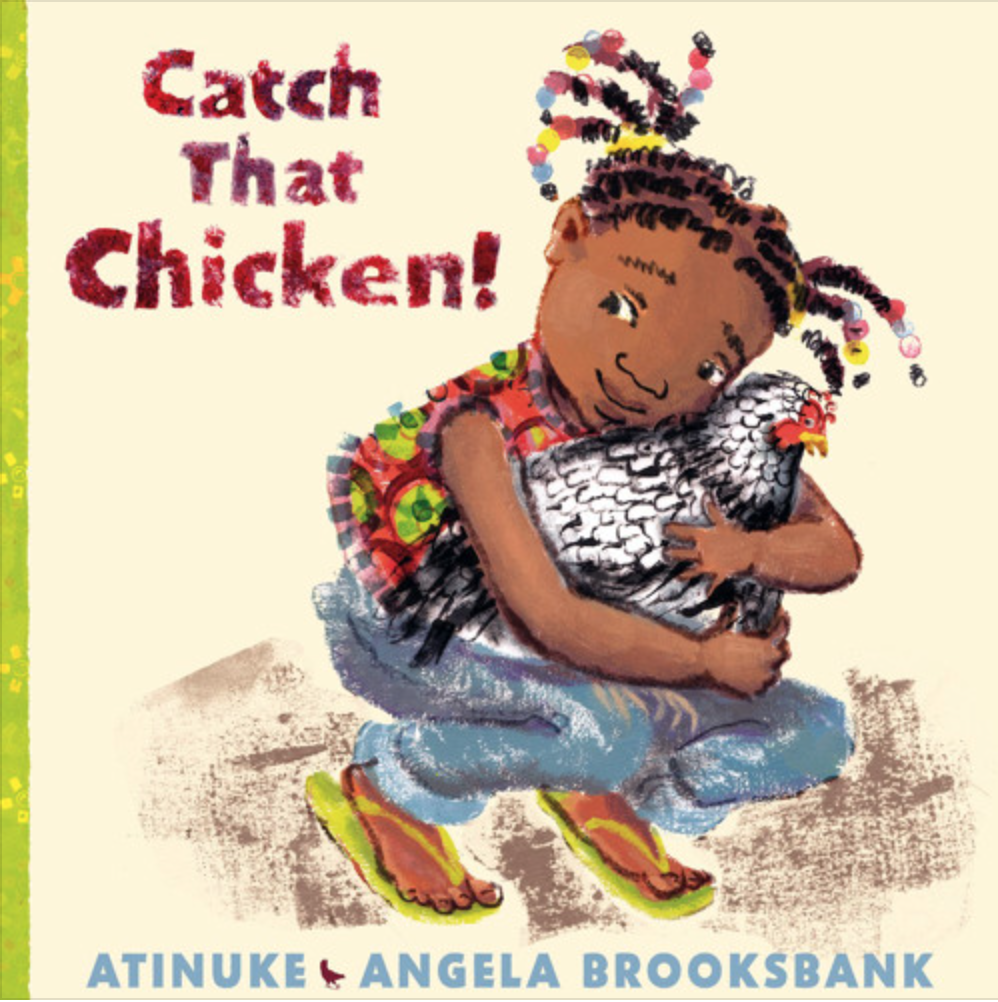
Transcript
My name is Sophia Wabosha and I'm from Kenya. I'm going to read to you a story called Catch That Chicken by Atinuke.
This is Lami. Lami loves chickens. Luckily, Lami lives in a compound...with lots and lots of chickens.
"Catch 'am, Lami! Catch 'am! shouts brother Bilal.
"Catch that chicken!" Shouts friend Fatima.
"Catch 'am, Lami! Catch 'am! Shouts sister Sadia.
"Catch that chicken!" Shouts Nana Nadia.
"Catch that chicken!" Shouts Daddy Danlami.
"Catch that chicken!" Shouts Aunty Aisha.
Lami leans! Lami lunges! Lami leaps! And Lami catches her! Lami is the best chicken catcher in the village.
Sister Sadia is speedy at spelling. But when it comes to the chickens...Lami is speedier.
Friend Fatima is fast at plaiting hair. But when it comes to chickens...Lami is faster.
Big brother Bilal is brave with the bulls. But when it comes to chickens...Lami is braver.
One day, Lami chases a chicken through the pen. "Sannu! Sannu!" Shouted the uncles. "Slow down!"
She chased that chicken round the compound. "Sannu! Sannu!" Shouts the aunties. "Slow down!"
She chased that chicken up the big baobab..."Sannu! Sannu!" Shouted the elders. "Slow down!"
But Lami scrambled speedily. Lami snatched suddenly. Lami slipped swiftly. And she fell!
She sprained her ankle so badly it puffed up like the neck of an angry lizard.
Lami cried. It hurts and now she could not chase, she could not climb, and she could definitely not catch chickens.
"If you are not careful, you will soon be the best in the village at crying," said Nana Nadia with a smile. "It's not quick feet that catches chickens, it's quick thinking."
Lami stared at her. Lami thought. She thought slowly...then she thought quicker and quicker and...suddenly Lami knew what to do! She could make the chicken come to her!
"Catch that chicken!" Whispered Nana Nadia. Caught her! Says Lami.
She is still the best chicken catcher in the village.
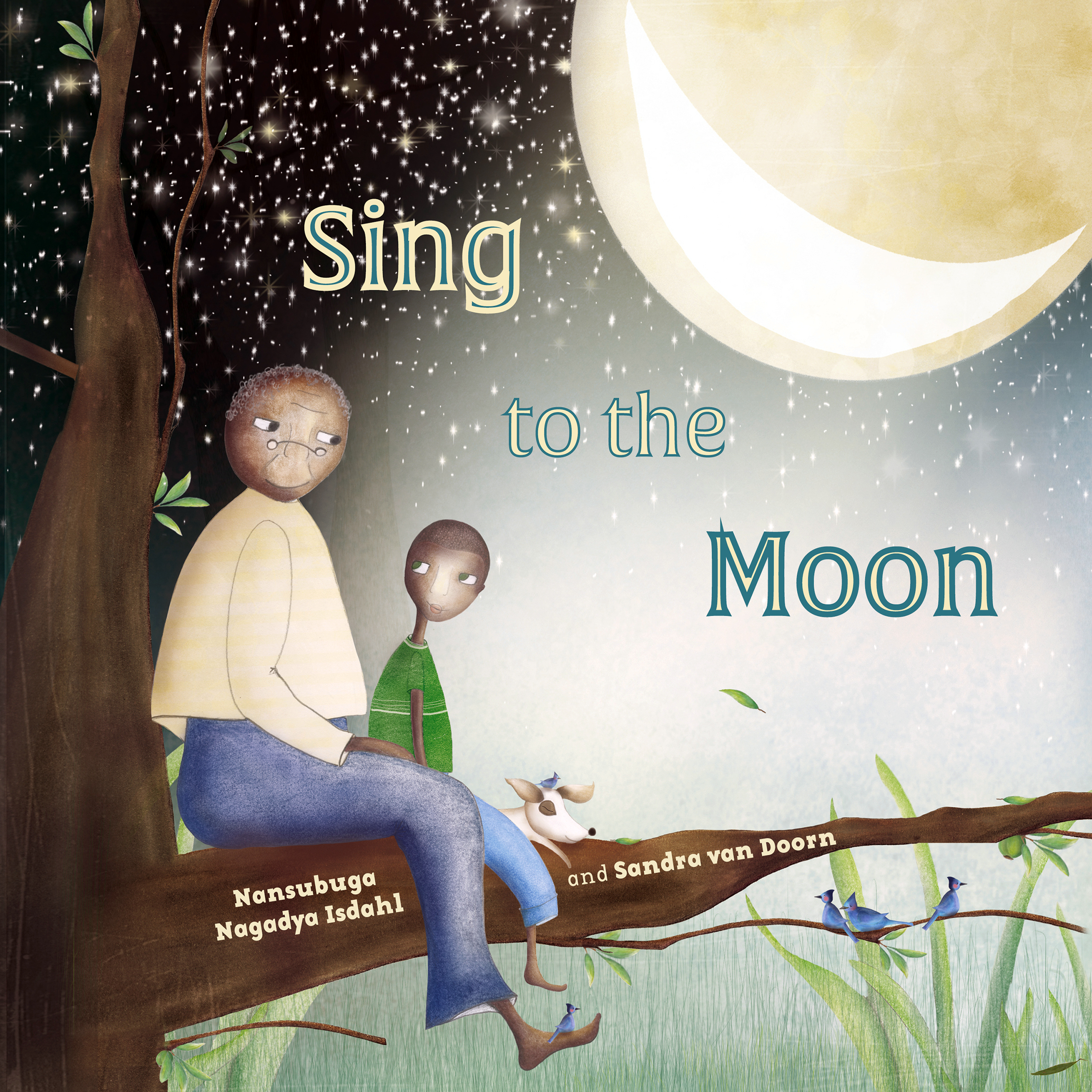
Transcript
I am Lubang Alex Charles from South Sudan. I'm going to read a story titled Sing to the Moon by Nansuboga Nagadaya and Sandra Van.
If I had one wish, I would reach the stars, then ride a supernova straight to Mars! Jjajja tells me, "Sing to the moon," and perhaps my wish will be granted soon.
With another wish, I would still go far - across the ocean to Zanzibar. I would sail on a dhow and gaze in wonder at old spice markets...till the sun goes under.
If had more wishes I would surely fly! I would take the crested crane up high. After spotting the forest's mythical beast, I would land at dusk for a monstrous feast!
Instead, I awake to the patter of rain, and watch the clouds spread like a charcoal stain. I think of the hours with nothing to do, except count the drops as they muddle the view.
But then I hear steps on the kitchen floor, so slowly I open the wooden door. Jjajja is drinking his hot morning tea and tells me that he has been waiting for me.
As we eat porridge, I glare at the gloom, announcing that I'm going back to my room! Jjajja stands tall - and in one, two, three - holds out his hands and says, "Let's go and see..."
We start in the storeroom to pack away peas, picked when the fields were last humming with bees. Jjajja remembers his childhood best friend...a boy called Kirabo whose smile did not end.
We clear the veranda of wet bamboo leaves...while Jjajja recalls climbing up guava trees. I say I love climbing guava trees too...and he tells me that's something he never knew!
The sun slowly sets and the day splits...in two. I can help clean Tilapia for the fish stew. Jjajja shares memories of trips as a child, when he and his father would fish in the wild.
With the daylight now gone and the dark settled in, Jjajja says our night adventures begin. He slowly unveils his tall tour of books, where he has stacked stories of bold kings and crooks.
By light of a candle we turn our pages of long ago fables passed down through the ages: tales of lost cities and great heaps of gold...African kingdoms and sights to behold.
And then Jjajja leaps to his feet to retell the story of how the sky rose and then fell. He thrills me with thunderous bangs! and kabooms!...then shoos me outside where the brilliant night croons.
We hear fires dance and the echo of drums, friends making meals, and the grasshoppers' hum. And Jjajja reminds me that I am always loved..by even the brightest of stars up above.
With one last glance at the shining night sky, we bid the sweet sounds of the evening goodbye. I know then that even new worlds far away...couldn't compare to this one rainy day.
And with a tired yawn, I stumble to bed, where I am tucked in with a kiss to my head. And, like every night, before leaving the room, Jjajja says quietly..."Sing to the moon."
Additional Audio Files
• Ali Baba and the Forty Thieves – Read by Fariah Lalaikipian
• Anansi and the Magic Cooking Pot – Read by Kenneth Mibut Dam
• Anansi and the Pot of Beans – Read by Shariphine Agoalikum
• Chicken in the Kitchen – Read by Khalid Abbas Jassan Saad
• From the Heart of Africa – Read by Jean Jacques Brou
• Gloria's Porridge – Read by Amina Salim Mbarak
• Maya Angelou Poems – Read by Fariah Lalaikipian
• Nelson Mandela Bio – Read by Rahila Ibrahim Ahmad
• Seeds of Change – Ready by Ewi Stephanie Lamma
• Sign to Me – Read by Ignace Nsengiyumva
• Sing to the Moon – Read by Lubang Alex Charles
• The Bear and the Two Friends – Ready by Lubang Alex Charles
• The Lion and the Mosquito – Read by Emma Fernande Martissi
• The Proud Peacock – Read by Michael Mwenya
• The Tale of the Pencil – Read by Lubang Alex Charles
• Walking for Water – Read by Amadou Rachid Miguel Diallo
Reflection
I had a wonderful experience working on this project and collaborating with the Mandela Fellows! This project helped me enhance my skills in audio recording and editing using Adobe Audition. Additionally, it provided me with an opportunity to improve my ability to give clear verbal instructions.
After the completion of the project, however, it seemed as though the project was sidelined and never really reached its final destination. The original plan was to send the final audio files to the Denver Public Library to help ESL (English as a Second Language) kids learn English by listening and reading along.

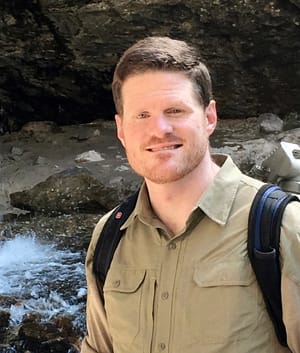

Member discussion